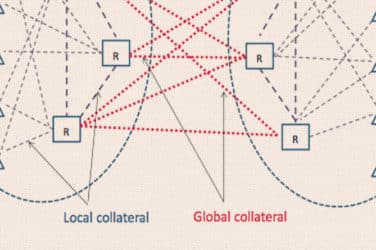
Dealers in OTC swaps are calling on the U.S. Commodity Futures Trading Commission to put on hold its “interpretive guidance and policy statement” regarding the cross-border applications of swaps provisions of the Dodd-Frank Act.
The guidance, issued in July by the U.S. regulator, is intended to inject much-needed clarity into the extraterritorial scope of the Dodd-Frank Act on the activities of swap dealers and major swap participants.
However, the International Swaps and Derivatives Association, in a letter sent Friday to the CFTC, recommended that the Commission postpone issuance of final cross-border guidance until an “understanding in principle” as to overlapping jurisdictions and comparable regulatory content is reached among the CFTC, SEC, and non-U.S. regulators.
Banks are girding for massive changes in the derivatives industry.
As estimated 40-50% of OTC contracts are expected to be cleared by the end of 2013, leaving a $2.5 trillion collateral hole to fill, according a report by Celent.
This will drive firms to optimize their internal inventory while simultaneously engaging with custodians, dealers, and clearinghouses offering collateral transformation services.
“Banks are operating against an economic backdrop of real negative growth, sovereign debt fragility, currency risk, poor inter-bank liquidity and lower confidence,” said Keith Saxton, director of global banking and financial markets at IBM. “Add to this the ever increasing demands of regulators and you end up with an industry that is being squeezed externally from many directions.”
Historically, many banks have responded to new regulations by setting up individual project teams with a narrow scope aimed at compliance only.
“While this strategy was adequate when the rate of regulatory change was low, the sheer volume of regulations that will be enforced over the next number of years, together with uncertainty with respect to some of the deadlines and scope demands a step-change in approach,” Saxton said. “Banks will need to move from expensive serial compliance with the minimum requirements to a transformation-led agenda that requires bold decisions to be taken that may radically change the nature of the bank, and an unerring focus on delivery.”
In order to promote a level playing field, ISDA said, non-U.S. swap dealers regulated by a G-20 jurisdiction should not be subject to U.S. regulation, except with respect to transaction-level requirements on trades done with U.S. persons, where the person exercising trading discretion on behalf of the U.S. counterparty is physically located in the United States.
In line with the commitment from the G20 group of nations, much progress has been made to coordinate and harmonize international reform efforts, but the pace of reform varies among jurisdictions and disparities in regulations remain.
For example, the European Market Infrastructure Regulation (Emir) regulates over-the-counter derivatives, central counterparties and trade repositories, while the updated Markets in Financial Instruments Directive (MiFID II), consisting of both a directive and a regulation, covers trade execution.
The CFTC guidance includes a tiered approach for requirements for overseas swap dealers. Some requirements would be considered entity-level, such as for capital, risk management and record keeping.
Such entity-level requirements would apply to all registered swap dealers, but, in certain circumstances, overseas swap dealers could comply with these requirements through substituted compliance.
Other requirements would be considered transaction-level, such as clearing, margin, real-time public reporting, trade execution and sales practices.
Both entity-level and transaction-level requirements would apply to all registered swap dealers, but, in certain circumstances, overseas swap dealers could comply with these requirements through substituted compliance.


